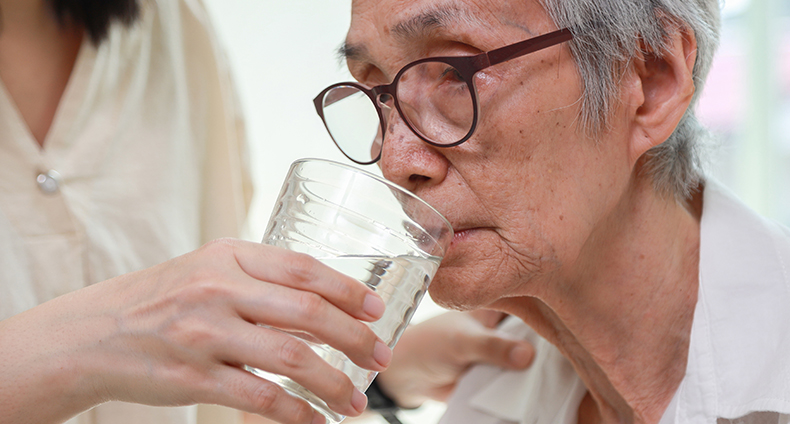
NO RECOVERY NO FEE Free Case Review
Nursing Home Abuse Lawyers Handling Malnutrition & Dehydration Claims
National representation for nursing home seniors who suffer abuse and neglect
There’s no excuse for dehydration or malnutrition. Nursing homes should know on a daily basis what liquids and food their residents need and whether their liquid and food levels should be changed. If there are physical or cognitive reasons why a senior is not receiving the liquids and nutrients he/she needs, the nursing home should ensure that a physician is consulted.
At Garcia & Coman, our nursing home dehydration and malnutrition lawyers are respected across the country for our impressive record of settlements and verdicts on behalf of nursing home residents. We work with nursing home professionals and physicians who are skilled at showing why nursing home abuse or neglect causes dehydration and malnutrition and the physical and emotional harm those failures cause.
NO RECOVERY NO FEE Free Case Review
How can we help?
- What are the dangers of dehydration?
- What are the symptoms of dehydration in the elderly?
- What are the dangers of malnutrition?
- What are the symptoms of malnutrition in the elderly?
- Why should nursing homes be accountable if their residents suffer from dehydration or malnutrition?
- What damages can a nursing home resident seek for dehydration or malnutrition?
- Do you have a nursing home abuse and neglect lawyer near me?

What are the dangers of dehydration?
According to the National Institutes of Health, “Among older adults, dehydration is common and is associated with several serious adverse events, including longer hospital stays and higher mortality rates.”
Acute dehydration is usually due to excessive water loss caused by an illness, heatstroke, or intense physical exercise. Acute dehydration should be fairly easy to notice. Chronic dehydration is usually due to insufficient fluid intake over a long period of time. It’s often insidious – harder to determine.
Seniors have a higher risk for chronic dehydration because they’re less sensitive to thirst, have a lower ability to urinate, and drink less than younger people. Blood tests are generally used to test dehydration in older people.
Elder residents who have cognitive difficulties will likely have difficulty stating whether they are thirsty. Staff turnover and lack of staff oversight of the drinking patterns of their residents can contribute to dehydration.
What are the symptoms of dehydration in the elderly?
Some of the symptoms of dehydration include:
- A dry or sticky mouth
- Feeling thirsty
- Dry skin
- A decrease in urine frequency and urine output
- An inability to sweat
- Low blood pressure
- Quickened breathing
In severe cases of dehydration, a nursing home resident may become unconscious or suffer from delirium. Complications include seizures, kidney failure, being in a coma, and swelling of the brain.
What are the dangers of malnutrition?
Malnutrition is categorized as either undernutrition (a resident is underweight and undernourished for their height and age) or overnutrition (a resident is overweight or obese). Most cases of nursing home malnutrition involve undernutrition.
Residents who are undernourished may suffer from:
- Low weight. This condition can cause anemia, fatigue, osteoporosis, and other disorders.
- A weakened immune system. A healthy diet provides the nutrition we need to fight infections and diseases. Undernourished residents with a weak immune system will need more time to recover from injuries and diseases.
- An increased likelihood of falling due to their frailty.
- An increased risk of diabetes, heart disorders, and cancer.
Other health problems for residents who are undernourished include joint and bone problems, scurvy, behavioral changes, and a worsening of other health disorders.
Malnutrition can be fatal.

What are the symptoms of malnutrition in the elderly?
Some of the signs of malnutrition include:
- Weight loss or gain
- Weakness and tiredness
- Difficulty swallowing
- Irritability
- Apathy
- More visible bones
- Less fat and muscle
- Cognitive impairment
- An increase in the frequency and severity of infections
- Canker sores
- Dry skin
- Low blood pressure
Malnutrition may be due to dental problems, illnesses, difficulty swallowing, and depression.
Why should nursing homes be accountable if their residents suffer from dehydration or malnutrition?
Nursing homes are generally liable for any abuses their staff engages in such as deliberately refusing to ensure a resident has enough liquids or is eating a healthy diet. Some of the reasons nursing homes may be liable for dehydration or malnutrition of a resident (through abuse or neglect) include:
- Poor supervision. The nursing home staff need to ensure their residents are fed and drink at normal eating times and throughout the day if necessary. Special feeding care is required for patients with dementia or eating disorders.
- The lack of assistance. Some residents know they need to drink and eat but need physical help getting the liquids or food into their mouths.
- A poor or unsanitary eating environment. Residents may not be inclined to drink or eat if the dining facilities aren’t clean. Seniors may be especially inclined to reject food that has little taste. Some residents may need dietary supplements.
- Failure to consider other health disorders. These disorders may include bedsores, pain, dental difficulties, back pain, and other health problems.
Some residents may be less inclined to eat if they’re isolated. Some nursing home staff intentionally punish residents with dementia or disciplinary issues by holding back their food and liquids.
Other reasons nursing homes may be responsible for dehydration and malnutrition include understaffing; improper training of the staff; and the lack of policies and procedures to address dehydration, malnutrition, or abusive treatment by the staff members.
Some of the steps nursing homes should take to ensure dehydration or malnutrition do not occur include:
- Proper staffing
- The creation and implementation of policies to address the dangers of dehydration and malnutrition
- Regular physical reviews
- Healthy between-meal snacks
- Consideration of supplements
- Physical exercise
What damages can a nursing home resident seek for dehydration or malnutrition?
At Garcia & Coman, our nursing home abuse and neglect lawyers are skilled at showing a staff member, administrator, or other third-party abused a resident or was neglectful – and that the abuse or neglect led to your (or a loved one’s) dehydration or malnutrition. We review the policies in procedures that were and were not in place. We review the resident’s medical records. We speak with the victim, the victim’s family and friends, the other residents in the facility, and witnesses who can help our client’s claim. We also formally question the nursing home and the nursing home staff – and thoroughly review any prior complaints, and every relevant aspect of the operation of the nursing home.
Your damages can include:
- Any medical bills necessary to maximize the resident’s health
- The pain and suffering of the resident
- The loss of the quality of life of a resident
If a loved one died, we file a wrongful death claim on behalf of the close family members.
Do you have a nursing home abuse and neglect lawyer near me?
Garcia & Coman represents seniors and families when residents become ill or die due to dehydration or malnutrition. We have the experience, resources, and respect of former clients and the legal profession to help residents and families obtain the full compensation they deserve.
Get help now. Contact our nursing home dehydration and malnutrition lawyers today
Food and water are the basics of life. It doesn’t take a medical degree to know that. Nursing homes need to do more than just put drinks and food on the dining room tables three times a day. They need to take proactive steps to ensure their residents are consuming the liquids and foods that they need, in the correct amounts, with the correct nutrition. At Garcia & Coman, our nursing home lawyers are recognized nationwide for our ability to prove a nursing home failed its residents by causing or failing to treat their dehydration or malnutrition. Call us or contact us today to schedule a free consultation. We have offices in California, Louisiana, and Arizona today. We serve clients throughout the country. We do not get paid – unless your claim is successful.
Se Habla Español

